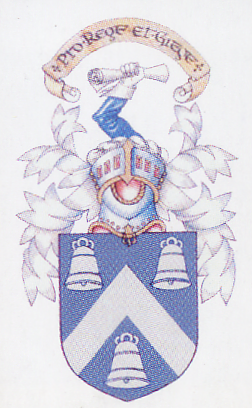|
Former Pupil Biographies
The Clunies Ross Family
THE COCOS (KEELING) ISLANDS were named after sighting of the group by
Captain William Keeling in 1609. On the 6th December 1825 Captain John
Clunies Ross, when on a short stop over on the Islands, cleared an area on
Direction and Horsburgh Island and planted cereal and vegetable crops. At
the time, Captain Ross was sailing a trading vessel called the Borneo for
Alexander Hare's trading company. It wasn't until the following year that
a settlement was established by Alexander Hare. With him, he brought a
crew of mainly Sumatran and Javanese seamen and women of various
nationalities. John Clunies Ross then settled himself on the South Island
and was determined to establish a good reputation in trading; Hare on the
other hand led a colourful, free and easy life. He desired and sought
obscurity and his behaviour, according to Clunies Ross, became unbalanced.
Both Hare and Clunies Ross put forward claims for ownership of the
Islands. However in 1831 Hare left and died soon after in Batavia. From
then on the people of Cocos planted coconut trees from which they
extracted the oil to sell and trade as Copra.
So it was that John Clunies Ross, born in Weisdale,Shetland Islands in
1786, became the owner of a large Copra farm on a remote island in the
Indian Ocean. His Malay workers addressed him as 'Tuan' (equivalent to
'sir') and it was this term that has wrongly been translated as 'King'.
This was the start of the myth of the 'Monarchs of Cocos', a myth that has
persisted ever since. John died in 1854 and his son, John George, took
over the running of the islands. He was referred to as 'Tuan pandai"
(clever or learned) by the Malays. He died in 1872. George, the eldest son
of John George, ran the islands from 1872-1910. Four of John George's
other sons, namely Charles, Edwin, Alfred and Alexander, were all educated
at Madras College, St Andrews, Scotland
|
Charles Clunies Ross (~1845 - 1910)
Charles was born about 1845 on the Cocos Islands. He attended Madras
College and subsequently St Andrew's University. In 1869 he started
working for his father at Cocos. He married his cousin Emily Clunies-Ross
in 1871 and had a family of 6 children.
In 1885 Charle's brother 'King' George sailed his newly finished schooner
the 'John George Clunies Ross' to England he left Charles in charge of the
Islands. It was during this time that E.W. Birch visited the islands to
write the government report. He wrote of Charles - "He is a strong, active
man, and like his brothers Edwin and Alfred, was a great football player,
boxer, and fencer in his younger days. He was brought up to Engineering.
He is a hardworking and astute man"
Charles left Cocos in 1902 with his family and went to live in Singapore,
where he died in 1910. |
|
Alfred Clunies Ross (~1851 - 1903)
Alfred was born around 1851 on Cocos. After attending Madras College he
then studied medicine in Edinburgh and during 1873 worked at St George's
Hospital in London.. E.W. Birch in his government report around 1885 wrote
of Alfred: "He was a medical student but did not graduate. He lives at the
Cocos and is the doctor of the place. He is a bachelor, an exceedingly
well-informed man, talks well on most subjects, and is very popular with
the natives. He is an excellent carpenter." He married his cousin Ellen at
Cocos in 1886 and they had 5 children.
The "St Andrews Gazette" records a cricket match played between St Andrews
University and Madras College in March 1864 (Madras won by 21 runs) and
mentions "the very clever hitting and fielding of Affie Ross, a lively and
smart little fellow, to all appearances not yet reached his teens". He is
also recorded playing a football fixture on 9th January, 1869 at the
Baxter Park, Dundee against Aberdeen University. He is there referred to
as Alf Ross and his brother Alex Ross was also in the team. Alfred was
also an excellent Rugby Football player. During his stay in Edinburgh he
played in the very first Rugby Football International between Scotland and
England. The Rugby Football Union was newly formed and the first fixture
they arranged was a match on 27th March 1871 at Raeburn Place, Edinburgh,
between Scotland and England. Alfred was in the Scottish XX team that day.
The result was a victory for Scotland.. He subsequently played for the
Wasps (1874-80) during his time in London.
In 1888 Alfred went to work in North Borneo. In 1901 he became seriously
ill and moved to Singapore. He returned to Cocos to recuperate in 1902 but
died in 1903.

In 1885 in the Cocos |

In 1871 playing for Scotland against England
in the first ever Rugby International |
|
|
Alexander Clunies Ross (1858 - ? )
Alexander was born in 1858 on Cocos. He was educated at Madras College and
subsequently became a student in Edinburgh studying navigation. He
returned to the Cocos Islands around 1876 and in 1879 he married Salpia.
E.W. Birch in his government report around 1885 wrote of Alfred: "He was
brought up as a sailor. He is married and has two little girls. They all
live at the Cocos. He is in charge of the boats, sails, etc.". His family
finally numbered 4 children.
In 1889 Alexander sailed to Christmas Island with his brother Andrew to
start a settlement there. It is not known when he died.
He is also recorded playing a football fixture on 9th January, 1869 at the
Baxter Park, Dundee against Aberdeen University. He is there referred to
as Alex Ross and his brother Alf Ross was also in the team. |

